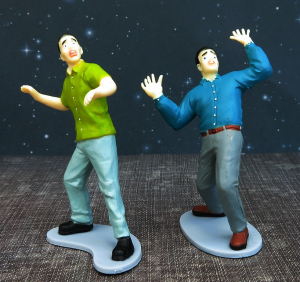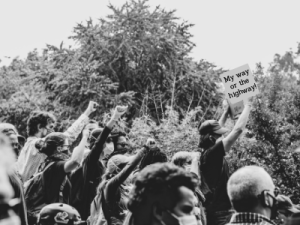Beware What You Celebrate
Just Thinking
 We live in a hyper-sexualized world that sparks questions about sin and values judgments for Christians.
We live in a hyper-sexualized world that sparks questions about sin and values judgments for Christians.
Years ago opinion columnist Peggy Noonan (https://bit.ly/3IZBDie) wrote a piece in which she noted how far our society had come in accepting the unwed mother and allowing her access to education in the same environment as other students. (Some of us are old enough to remember when a pregnant girl wasn’t allowed to attend school.) Here’s an excerpt from Noonan’s piece:
- “I was at a graduation ceremony at a public high school in New Jersey. It was 1971 or 1972. One by one a stream of black-robed students walked across the stage and received their diplomas. And a pretty young girl with red hair, big under her graduation gown, walked up to receive hers. . . . The girl was eight months pregnant and had had the courage to go through with her pregnancy and take her finals and finish school despite society’s disapproval.”
 Surprised at what she witnessed, Noonan admired the girl’s heart and grit. But when the audience erupted in a standing ovation, Noonan felt a profound shift that sent her to thinking deeply about what she was witnessing. Eventually she summarized her thoughts with this well-known quote:
Surprised at what she witnessed, Noonan admired the girl’s heart and grit. But when the audience erupted in a standing ovation, Noonan felt a profound shift that sent her to thinking deeply about what she was witnessing. Eventually she summarized her thoughts with this well-known quote:
- “Message to society: What you applaud, you encourage. [But] Watch out what you celebrate.”
 I’ve been thinking about Noonan’s quote in recent months and years—in particular, as it relates to our society’s ever-changing world of sexuality and Christians’ responses to it. This has taken me back to a young man in my small home town in the late ’50s to early ’60s. He dressed in women’s clothing and walked along our downtown streets in full make-up, posing, swinging a purse, and throwing kisses. Some people stopped and stared while others diverted their eyes as if they hadn’t witnessed the stunning display. That young man was an outcast in our little town.
I’ve been thinking about Noonan’s quote in recent months and years—in particular, as it relates to our society’s ever-changing world of sexuality and Christians’ responses to it. This has taken me back to a young man in my small home town in the late ’50s to early ’60s. He dressed in women’s clothing and walked along our downtown streets in full make-up, posing, swinging a purse, and throwing kisses. Some people stopped and stared while others diverted their eyes as if they hadn’t witnessed the stunning display. That young man was an outcast in our little town.
That was a lot of years ago. 65-ish, in fact. The world has changed since then. Indeed. Today the same scene we witnessed on our hometown sidewalks not only is accepted but is celebrated around the world and on TV/social media many times everyday, even by Christians. When I consider the contrast between then and now, I try to set Noonan’s “Watch out what you celebrate” lens into my 21st century Christian viewfinder and ask myself two probing questions:
- How should we have responded to that young man back then? And can those answers inform us today?
 Should we have pretended he didn’t exist? Shaken our heads and tsk-tsked in disdain? Or looked at him in sympathy and walked on? Should we have laughed and made jokes at his expense or pulled away in shock as if he were a character from a horror movie? Perhaps we should have gathered our likeminded friends and bullied him into retreating to his home “where he belonged.” Sadly, our townsfolk reacted in all those ways.
Should we have pretended he didn’t exist? Shaken our heads and tsk-tsked in disdain? Or looked at him in sympathy and walked on? Should we have laughed and made jokes at his expense or pulled away in shock as if he were a character from a horror movie? Perhaps we should have gathered our likeminded friends and bullied him into retreating to his home “where he belonged.” Sadly, our townsfolk reacted in all those ways.
Then again, we could have done what no one dreamed of back then—taken out TV and newspaper ads about how brave he was? Maybe even create a symbol for his alternate lifestyle—preferably one that would take a swipe at Bible believers—and display it publicly to show our pride in our own broad-mindedness? Should we have thrown a party where he could display his full regalia with pride while we clapped and cheered?
- What would any of that have accomplished for him? The rest of the town. Or Christ?
 To the contrary, what if we had seen his lifestyle as sin in need of redemption, the same as our own, and crossed the street to engage him in conversation, maybe invited him to join us for coffee or even church? What if we had gone to our knees in supplication to God regarding how to interact with him in love for his eternal soul?
To the contrary, what if we had seen his lifestyle as sin in need of redemption, the same as our own, and crossed the street to engage him in conversation, maybe invited him to join us for coffee or even church? What if we had gone to our knees in supplication to God regarding how to interact with him in love for his eternal soul?
Then again, should we have chastised ourselves for noting his sin at all since we were so full of sin ourselves, thus leaving undone our crossing the street, conversing, and inviting him to church?
- What might these choices have accomplished for him, the rest of the town, or for Christ?
 By all accounts, this young man was gentle and kind. But what if he had been militant about his lifestyle—say, stepped into our downtown with a bullhorn and noise makers, going in and out of stores and getting into shoppers’ faces to force them to look at him and react? What if he had gathered likeminded friends and attended a city council meeting, refusing to put away the bullhorn until they gave him a platform on which to proclaim his lifestyle not only as acceptable but as worthy of celebration? (Truthfully, he would have been arrested for disturbing the peace back then.)
By all accounts, this young man was gentle and kind. But what if he had been militant about his lifestyle—say, stepped into our downtown with a bullhorn and noise makers, going in and out of stores and getting into shoppers’ faces to force them to look at him and react? What if he had gathered likeminded friends and attended a city council meeting, refusing to put away the bullhorn until they gave him a platform on which to proclaim his lifestyle not only as acceptable but as worthy of celebration? (Truthfully, he would have been arrested for disturbing the peace back then.)
In 2023 I ask the same questions of myself, but Noonan’s “Beware what you celebrate” lens cancels out the noise and focuses my mind on the difference between acceptance and celebration, which often includes promotion. That lens becomes even sharper when I allow Jesus’ encounter with the woman caught in adultery to refine and clarify even further. If I take His words to the cruel crowd—Let whoever is sinless cast the first stone—as justification for ignoring or celebrating sin, I miss His intent.
- He spoke not only to the crowd but to the woman herself: “Go and sin no more.”
So I ask you, Christian friend: What’s the lens through which you view homosexual individuals and homosexuality in its myriad forms? The Bible makes it clear such behavior is sin, as it does adultery, lying, cheating, lust, and a slew of others. Jesus rebuked the crowd for their cruelty and judgmental hearts that saw the woman’s sin but not their own.
- But he also commanded the woman to sin no more.
Did He take the woman’s hand and say, “Look at this woman. Let’s celebrate her sin.” To the contrary, He confronted her sin. And if she repented, He would have raised her penitent head, taken her hand, and said, “Let’s celebrate this woman, for my sheep that was lost is found.”
What would happen if we all wore Jesus-inspired Noonan lenses? What if we cast away all emotional and base human reactions, both to homosexuality and to judging others’ hearts , and focused on casting away sin without casting away the sinners?
, and focused on casting away sin without casting away the sinners?
We Christians in this fallen world must confront sin. And we must beware what we celebrate, all the while remembering the Lord has called us to be fruit inspectors, not tree destroyers.
